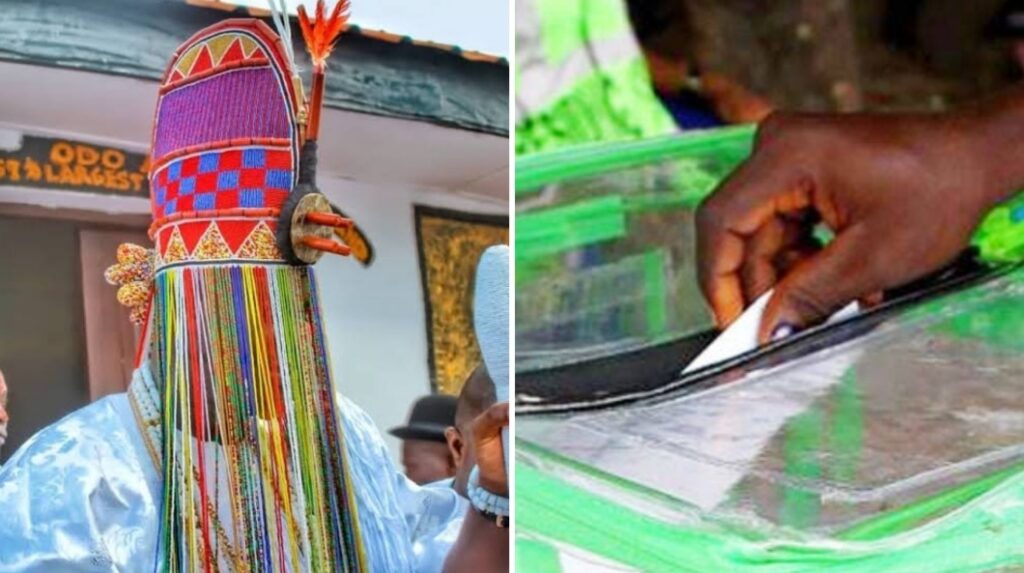It is displeasing to note that royal princes no longer get crowned with honor and acceptance. To enthrone a royal prince nowadays, you only need few trusted persons within the traditional council and armed men to protect the royal one and the palace.
Those who install them including their ardent loyalists believe that it is not necessary that monarchs undergo all traditional rites which include selection process.
They also think it is not necessary for royal princes to receive the blessings of his ancestors. And it is only the person who follows the ways of the ancestors that receives their blessings.
Each time a particular person occupied a throne, he was either forcefully crowned against the wishes of the kingmakers or the divided acceptance of the people. Royal fathers just want to sit on throne and wear big Agbadas, they actually do not care about the acceptance of the people.
There are ancient towns in Yorubaland without traditional rulers. Several stools are still empty without occupants. If the kingmakers are not exhibiting dubious behaviors, interested government officials who have preferred candidates manipulate the process. Both kingmakers and government officials now have proffered candidates.
The recent troubles which surrounded the choosing of traditional rulers in Ikirun, Iree and other towns in Yorubaland and the continued delay in the replacement of late Oba Olayiwola Atanda Adeyemi III are critical examples of how low our traditional institutions have become and this should be a concern for true Yorubas.
In the olden days, Ifa plays a vital role in choosing Yoruba monarchs and the process of crowning one are non-bureaucratic, procedural (strict) and very traditional. Through ifa divination, we resolve issues of royal houses and peacefully pick out of hundreds of princes from the chosen house.
The royal candidate with the highest ‘Ifa corpuses’ (Odu Ifa to ba kun ju) becomes the ultimate winner of the royal contest. There would be conflicts from other sides but he will emerge victoriously because the gods and ancestors have favored him.
Nowadays, kingmakers now vote. And candidate with higher number of votes emerges. Highest bidders claim thrones. Those who have money to spend and contacts of big people claim throne.
They bribed kingmakers to manipulate the process and sometimes work hand in hand with government officials to frustrate the process if it does not suit.
Monarch now claims that a particular political party gave him the crown, hence his loyalty to the party.
We have heard cases where kingmakers refuse to convey to elect monarchs because they have fears over their preferred candidates. We equally have cases where government officials force down into the throats of kingmakers their own choice.
When interests do not align, violence is inevitable. That’s the situation of Ikirun, Iree, Oyo and other towns in Yorubaland and it must be addressed.
Personally, I believe the kingmakers are unnecessarily powerful and the influence of politicians in choosing monarchs is annoying.
The process of choosing monarch in Ibadan remains the most transparent one in the entire Yoruba race.
We must initiate ways to reduce the influence of the duo and ensure that no single individual or parastatal has sole powers to crown a king.
Following the allegations of manipulations leveled against the kingmakers and choking influence of politicians which have caused several conflicts, it is my position that we should allow royal candidates to be elected via voting by the people of each town.
This seems to be more democratic than the powers only vested on kingmakers to pick since Ifa divination of choosing one did not survive modernity.
Natives and residents populate a town. For every native, he or she has a family compound related to. And these compounds have heads we call ‘Olori-Ebi’.
I strongly believe that if we allow heads of family compounds (Olori-Ebi) to vote and elect king which would be monitored by INEC, there will be less violence and manipulations.
We only need to strengthen INEC as an electoral body and put in more resources. Traditional rulers would still maintain their permanent tenure and there will still be cultural artefacts to promote Yoruba. We should not even bother about cultural dilapidation.
Kings now open their heads in churches to praise. They now go to local eateries with wives to eat. They sometimes go to political rallies to declare their stand.
Politicians now send traditional rulers errand, like a monarch representing a politician at public functions. That’s the new low and why it is important for us to introduce fresh ideas that can make Yoruba monarchy survive this difficult phase. Atleast kings are no more cultural but we can make them acceptable by majority via election.
If family heads are allowed to vote, there will be little or no tales of manipulations of few. Royal candidates should be allowed to campaign from one family compound to another. They must submit their certificates for vetting and others. If any issue arises, it is more palatable to hear about the disruption of voting exercise by many than seven kingmakers fighting over voting exercise.
We can avoid blocking of major roads leading to palace by aggrieved youths. We can control the closing of gates and hijacking of palaces by youths.
Traditional rulers can stop traveling to the state capital for installation due to fear and possible attacks. We will be free from the consequences of decision of few (kingmakers) and every native would be able to hold his or her family head.
Sodiq Lawal Chocomilo writes from Osogbo, the capital
